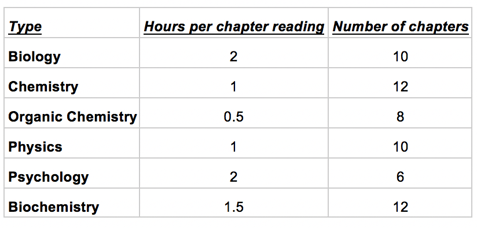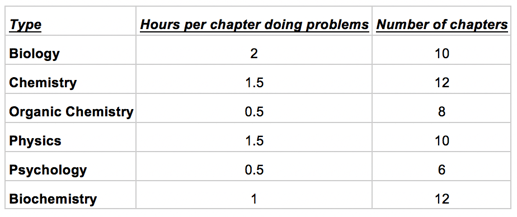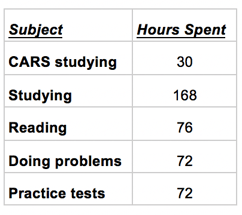I am going to estimate how long a student might take to study for the MCAT test using the books I recommend for my students under the premise that someone is studying full time. This is an estimate, but I think it paints a decent picturse of what a fulltime MCAT student can expect. For part time students, they would spread this over a longer period of time (I hope).
CARS
I recommend my students do one passage every day. Including reviewing it, this takes about 20 minutes on average. So 6 days a week, that’s 2 hours per week. Additionally, I will give them entire MCAT test practice sections probably about 5-6 times over the course of their studying. All totaled, I would guess that about 30 hours are spent on verbal over the whole study period.
Reading
Based on using the Berkeley Review Materials with a Kaplan Biochemistry book for MCAT test preparation, my students typically experience the following time commitment by type of material

This comes to 76 hours of reading. While I am categorizing this as reading, students might also be looking at you tube videos or using other sources, but these are decent estimates for the time commitment.
Studying
Many of my students start learning the MCAT test under the impression that reading the chapters and doing the problems is enough to do well: I do my best to disabuse them of this notion as fast as possible. Unfortunately, we tend to forget things we read rather quickly if we do not review them. If one wants to remember something, one of the best ways to do so is to practice retrieving it from memory. I generally push my students to use electronic flashcards that take advantage of the Spacing Effect to improve ones memory. I have had enough students at this point who have consented to my sharing their flashcard decks that I have almost a full collection of flashcards that I give to my new students starting out, so I know they have about 5,000 cards to learn. If they spend 30 seconds to learn each card initially, and 10 seconds to review it each time thereafter (generous, most students take less). The spacing pattern I recommend to my students will have them review each card 8 times over the next few months. This comes to 110 seconds per card, or 168 hours for all cards.
Doing problems
Polling some current and former students, below is the general breakdown of how long each type of problem set takes my students.

This comes to 72 hours of time spent solving problems total.
Doing practice tests
These days, my students who score well tend to do approximately 9 practice MCAT tests. Each one takes the whole day to do and review, so I count that as 8 hours for 72 hours spent taking practice tests.
Total Time
The full amount is summarized in the table below.

All together, this is 418 hours of studying for the MCAT test, which if you assume someone is studying full time (35 hours/week), can be done in just under 12 weeks. I don’t consider time spent being tutored in this, which would be about 2-4 hours per week for a full-time studying. This is about as intense a schedule as I advise my students to have, and multiple students have cleared the 95th percentile using it.
All this considered, it is not enough just to put in the hours. A student also has to be smart and use solid strategies and good tactics.
Comments